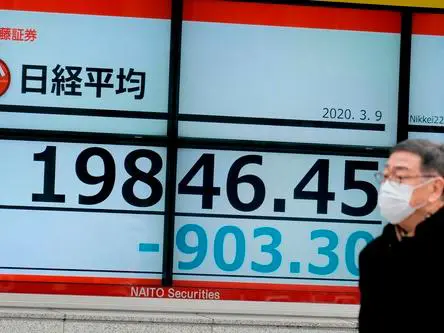Tokyo stocks tanked Friday to close substantially lower, with the benchmark Nikkei stock index at one point logging the steepest one-day point decline since April 1990, as continued coronavirus concerns propelled a global rout engulfing markets here.
The 225-issue Nikkei Stock Average tumbled 1,128.58 points or 6.08 percent, from Thursday to close the day at 17,431.05, marking its lowest closing level since Nov. 11, 2016 and its largest-ever weekly decline.
The broader Topix index of all First Section issues on the Tokyo Stock Exchange, meanwhile, dropped 66.18 points, or 4.98 percent, to end at 1,261.70.
The huge volume of sell orders in morning trade on the back of U.S. and European shares free-falling overnight due to coronavirus-linked fears, saw trading halted for around 10 minutes, local brokers said, setting the tone for a frenzied morning sell-off.
"Panic started from the open and accelerated," Akira Tanoue, a senior strategist in the investment research department at Nomura Securities Co., was quoted as saying.
Tanoue's sentiments were echoed by Takuya Hozumi, global investment strategist at Mitsubishi UFJ Morgan Stanley Securities, who said, "It feels like panic. Investors are selling even assets that should not be largely affected by the coronavirus, ignoring all the fundamentals."
Wall Street took another nosedive overnight, with the Dow Jones Industrial Average booking its biggest percentage fall since the Black Monday market meltdown in 1987, following Washington slapping a travel ban to and from mainland Europe. It triggered panic selling as concerns increased over the impact of the virus on international business and trade, market analysts here said.
"With so many restrictions on people's moves, this will be a man-made recession. If governments stop human moves to such an extent, they need economic safety nets too," said Hiroshi Watanabe, senior economist at Sony Financial Holdings.
The market's early plummet prompted Japanese government officials and those from the Bank of Japan (BOJ) to convene an emergency meeting at which they reaffirmed their commitment to continue to closely observe markets and intervene as deemed necessary to ensure financial stability.
"Financial and monetary authorities will be more vigilant than ever in monitoring market developments and closely cooperate with other members of the Group of Seven and the Group of 20," Yoshiki Takeuchi, Japan's vice finance minister for international affairs, told a press briefing on the matter.
The BOJ said it was ready to inject 500 billion yen (4.71 billion U.S. dollars) of liquidity into markets through government bond purchases.
The central bank also said it would buy up to 200 billion yen (1.88 billion U.S. dollars) in bonds and lend 1.5 trillion yen (14.15 billion U.S. dollars) to financial institutions.
Market analysts here, however, said the market's reaction to the BOJ's statement was largely muted, with investors more concerned about the prospect that the Tokyo Olympics this summer may be postponed or cancelled.
Japanese Prime Minister Shinzo Abe and U.S. President Donald Trump held telephone talks on Friday, with Abe saying Japan would continue to prepare for Tokyo to host the Olympic and Paralympic Games this summer.
Norihiro Fujito, senior investment strategist at Mitsubishi UFJ Morgan Stanley Securities Co., said, "Selling by foreign investors who are pricing in the risk of a delay in the Tokyo Olympic Games dominated the market."
In later trade, investment strategists said that U.S. stock futures bouncing back in off-trading hours helped lessen market woes and trim losses to an extent as the U.S. dollar gained against the safe-haven yen to the mid-105 yen zone.
The U.S. dollar was quoted at 105.83-85 yen at 5:00 p.m. local time, compared with 104.59-69 yen in New York and 103.66-68 yen at 5:00 p.m. on Thursday in Tokyo.
By the close of play, all industry categories closed in negative territory, with mining, real estate and air transportation issues comprising those that declined the most.
Issues that declined trounced those that advanced by 2,099 to 64 on the First Section, while three ended the day unchanged.
On the main section on Friday, 3.459 billion shares changed hands, rising from Thursday's volume of 2.583 billion shares.
The turnover on the final trading day of the week came to 4,892.3 billion yen (46.02 billion U.S. dollars).
 简体中文
简体中文







